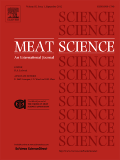
MEAT SCIENCE
Scope & Guideline
Shaping Tomorrow's Meat Science Today
Introduction
Aims and Scopes
- Meat Quality Assessment:
Research on various factors influencing meat quality, including pH, tenderness, juiciness, and flavor profiles. This area encompasses both sensory evaluations and instrumental measurements. - Food Safety and Microbiology:
Studies addressing microbial contamination, pathogen control, and preservation methods to enhance meat safety. This includes research on biopreservation techniques, antimicrobial agents, and the effects of processing on microbial load. - Nutritional Aspects of Meat:
Examinations of the nutritional value of different meat types, including fatty acid profiles, amino acid compositions, and the impact of dietary sources on meat quality. - Innovative Processing Technologies:
Research on novel meat processing methods such as high-pressure processing, sous-vide cooking, and the use of natural preservatives to improve meat quality and shelf-life. - Consumer Behavior and Market Trends:
Investigations into consumer preferences, perceptions of meat quality, and the factors influencing meat purchasing decisions. This includes studies on health, sustainability, and ethical considerations in meat consumption. - Genetic and Physiological Factors:
Research exploring the genetic basis of meat quality traits, including studies on muscle fiber characteristics, proteomics, and the impact of animal genetics on meat attributes.
Trending and Emerging
- Sustainable Meat Production:
Increasing focus on sustainable practices within meat production, including the use of alternative feed sources, reduction of environmental impacts, and consumer demand for ethically sourced meat. - Advanced Analytical Techniques:
Growing interest in employing advanced technologies like machine learning, near-infrared spectroscopy, and metabolomics to assess meat quality, authenticity, and safety. - Health and Wellness Trends:
Research linking meat consumption to health outcomes, addressing issues such as red and processed meat consumption and its implications for cardiovascular health and dietary guidelines. - Alternative Proteins and Meat Substitutes:
Emerging research on the acceptance and quality of alternative protein sources, including cultivated meat and plant-based substitutes, reflecting changing consumer attitudes towards meat consumption. - Biotechnology in Meat Preservation:
Innovative approaches utilizing biotechnology for meat preservation, including natural preservatives, probiotics, and the use of bioactive compounds to enhance shelf-life and safety.
Declining or Waning
- Traditional Meat Processing Techniques:
There has been a noticeable decrease in research specifically focused on conventional meat processing methods, as newer technologies and innovative approaches gain prominence. - Basic Nutritional Analysis:
Studies that merely assess basic nutritional components of meat without linking them to broader health implications or consumer perceptions have been less frequent, suggesting a shift towards more integrated research. - Animal Welfare Practices in Meat Production:
Although still important, the frequency of publications specifically dedicated to animal welfare practices in the context of meat production has decreased, possibly overshadowed by more pressing food safety and quality research.
Similar Journals
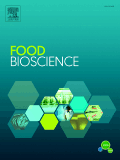
Food Bioscience
Shaping the Future of Food Science with Cutting-Edge ResearchFood Bioscience is a leading peer-reviewed journal published by Elsevier, dedicated to advancing the understanding of the complex interplay between food science and biosciences. With an impressive Impact Factor that places it in the Q1 and Q2 quartiles for Food Science and Biochemistry respectively, the journal consistently ranks among the top publications in its field, reflected in its Scopus rankings (Rank #83/389 in Food Science and Rank #175/438 in Biochemistry). Since its inception in 2013, Food Bioscience has fostered a multidisciplinary approach, bridging gaps between research in agricultural, biological, and food sciences, thus encouraging innovative solutions to the pressing challenges facing the global food supply chain. Although it currently operates under a subscription model, the journal is committed to disseminating high-quality research, making significant contributions to both academic scholarship and industry practices. Researchers, professionals, and students alike are invited to explore the wealth of knowledge contained within its pages as it plays a pivotal role in shaping the future of food bioscience.

Animal Bioscience
Shaping Tomorrow's Animal Welfare Through ResearchAnimal Bioscience is a premier journal dedicated to advancing the field of animal science, published by the esteemed ASIAN-AUSTRALASIAN ASSOCIATION OF ANIMAL PRODUCTION SOCIETY. With an impactful presence in South Korea, this journal serves as a pivotal platform for disseminating high-quality research in animal production, nutrition, genetics, and veterinary sciences. Its notable standing is reflected in its categorization within the Q1 quartile for Animal Science and Zoology and Veterinary (miscellaneous) disciplines, highlighting the journal's dedication to excellence and relevance. Additionally, Animal Bioscience has secured impressive rankings in various related fields, with a 94th percentile position in general veterinary studies. As an Open Access publication, it encourages broad distribution and engagement with its content, making significant contributions to the global discourse surrounding animal technology and welfare. This journal is an invaluable resource for researchers, professionals, and students aiming to deepen their understanding and promote innovations in animal biosciences.
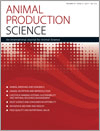
Animal Production Science
Exploring the Future of Animal Science and Food ProductionAnimal Production Science, published by CSIRO PUBLISHING, is a prestigious journal that caters to the fields of Animal Science and Food Science. With an ISSN of 1836-0939 and an E-ISSN of 1836-5787, the journal features high-quality research and reviews that are crucial for advancing the understanding and innovation of animal production systems. Recognized within the Q2 category of both Animal Science and Zoology, and Food Science, as per the 2023 Journal Rankings, Animal Production Science has achieved commendable Scopus rankings, placing it in the 68th and 48th percentiles in its respective categories. With converged years from 2009 to 2024, and an aim to disseminate knowledge that promotes sustainable practices, the journal is pivotal for researchers, professionals, and students devoted to animal production and food security. Exploring topics from livestock management to food quality, the journal offers valuable insights for enhancing productivity while considering welfare and environmental impact. For those seeking accessibility, the journal provides various open access options, encouraging a wider reach of its scholarly articles.
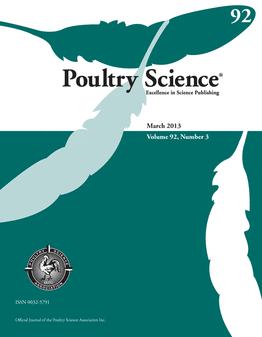
POULTRY SCIENCE
Leading the way in poultry innovation and research.POULTRY SCIENCE is a premier, peer-reviewed journal published by ELSEVIER, dedicated to advancing the field of avian biology and poultry production, encompassing a wide array of topics from genetics and physiology to nutrition and management practices. With an impressive impact factor and inclusion in the Q1 quartile for both Animal Science and Zoology as well as Miscellaneous Medicine, this journal is recognized as a leading source of high-quality research among its peers, ranking 17th out of 490 in its category. Since transitioning to Open Access in 2020, the journal has expanded its reach, allowing global accessibility to its significant findings, which are crucial for researchers, industry professionals, and students alike. The journal’s continuous publication from 1965 to 2024 underscores its long-standing commitment to fostering innovation in poultry science, making it an invaluable resource for anyone involved in the progression of this vital sector.

International Food Research Journal
Cultivating Knowledge for a Sustainable Food FutureThe International Food Research Journal, published by UNIV PUTRA MALAYSIA PRESS, serves as a pivotal platform for disseminating innovative research within the field of food science. With an ISSN of 1985-4668 and an E-ISSN of 2231-7546, the journal has successfully established its presence since its inception in 2007, converging its findings through 2024. This esteemed journal holds a Q3 ranking in Food Science, illustrating its valuable contributions to the field as demonstrated by its Scopus rank of 276 out of 389, placing it in the 29th percentile among its peers in Agricultural and Biological Sciences. Although it operates under a traditional publishing model, its academic integrity and focus on high-quality research ensure that it remains a vital resource for researchers, professionals, and students eager to explore advances in food technology, nutrition, and safety. By encouraging interdisciplinary collaboration and critical dialogue, the International Food Research Journal plays an essential role in shaping the future of food science research.

COMPREHENSIVE REVIEWS IN FOOD SCIENCE AND FOOD SAFETY
Exploring the Frontiers of Food Science and SafetyCOMPREHENSIVE REVIEWS IN FOOD SCIENCE AND FOOD SAFETY, published by Wiley, is a premier journal dedicated to advancing the understanding of food science and safety through thorough and critical reviews. With an impressive Q1 ranking in the field of Food Science and a notable Scopus ranking of #4 out of 389 in Agricultural and Biological Sciences, this journal occupies a vital position within the academic community. Its rigorous approach to publishing comprehensive reviews serves as an invaluable resource for researchers, professionals, and students aiming to stay abreast of current trends and advancements in the food sector. Although the journal does not offer open access options, its contributions from 2002 through 2024 reflect a commitment to high-quality scholarship and knowledge dissemination. Researchers looking to elevate their understanding of food safety and related disciplines will find this journal an essential addition to their academic repertoire.
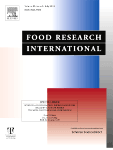
FOOD RESEARCH INTERNATIONAL
Connecting Experts in Food Science WorldwideFOOD RESEARCH INTERNATIONAL is a premier academic journal published by ELSEVIER, specializing in the field of Food Science. With an impressive impact factor and ranked Q1 in the 2023 category quartiles, it stands at the forefront of research, positioned 17th out of 389 in the Scopus ranking for Agricultural and Biological Sciences, attaining a commendable 95th percentile. The journal publishes high-quality, peer-reviewed articles that cover a broad spectrum of topics, including food safety, quality control, nutrition, and biotechnology, making it an invaluable resource for academics, industry professionals, and students alike. As FOOD RESEARCH INTERNATIONAL seeks to enhance understanding and advance technologies related to food, it encourages innovative perspectives and interdisciplinary research. The journal, active from 1992 and continuing through 2024, is an essential platform for disseminating vital findings and fostering collaboration within the global food science community.
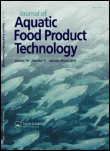
Journal of Aquatic Food Product Technology
Innovating the intersection of aquatic life and food technology.Journal of Aquatic Food Product Technology is a vital publication dedicated to advancing research and innovation in the fields of aquatic science and food technology. Established in 1992 and published by TAYLOR & FRANCIS INC, this journal provides an exceptional platform for researchers, professionals, and students to share their findings and insights on the science and technology surrounding aquatic food products. With an ISSN of 1049-8850 and an E-ISSN of 1547-0636, the journal caters to a global audience, contributing to significant advancements in both the agricultural and biological sciences. As of 2023, it holds a prestigious position in the Q3 quartile for both Aquatic Science and Food Science categories, reflecting its role in the scientific community. Furthermore, with Scopus rankings placing it at #106 out of 247 in its field, this journal is an essential resource for those dedicated to understanding and innovating in the domain of aquatic food products. Although not an open access journal, it ensures that the important research it publishes is accessible to a wide audience interested in improving food safety, sustainability, and nutrition from aquatic sources.

Translational Animal Science
Enhancing Animal Welfare Through Translational ResearchTranslational Animal Science, published by Oxford University Press Inc, stands as a prominent journal in the fields of Animal Science and Zoology as well as Veterinary Sciences, achieving a commendable Q2 ranking in both categories for 2023. With an E-ISSN of 2573-2102 and transitioning to an Open Access model since 2017, this journal fosters accessibility and dissemination of vital research that bridges the gap between basic animal science and its practical applications. The journal's significant impact factor, where it ranks in the 71st and 65th percentiles respectively for Veterinary and Agricultural and Biological Sciences disciplines, highlights its importance as a resource for emerging trends and innovations in animal research. With submissions accepted until 2024, Translational Animal Science not only contributes to advancing knowledge but also aims to engage a broad audience of researchers, professionals, and students dedicated to improving animal health and welfare. Based in India, the journal serves as an essential platform for the exchange of scientific ideas that facilitate progress within these vital fields.
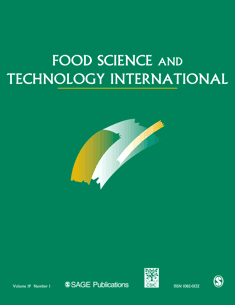
FOOD SCIENCE AND TECHNOLOGY INTERNATIONAL
Fostering knowledge and innovation in food science.FOOD SCIENCE AND TECHNOLOGY INTERNATIONAL, published by SAGE Publications Ltd, is a premier journal in the fields of food science and technology, serving as a crucial platform for the dissemination of innovative research and practical applications from 1995 through to 2024. With an impact factor reflecting its significant standing—ranking in the Q2 quartile for Chemical Engineering, Food Science, and Industrial and Manufacturing Engineering—this journal plays an instrumental role in advancing the interdisciplinary study of food systems. Researchers, professionals, and students can access high-quality contributions that address the latest developments and trends in food technology, safety, and processing. Located in the United States, FOOD SCIENCE AND TECHNOLOGY INTERNATIONAL also boasts commendable Scopus rankings, ensuring its articles are both relevant and widely cited within the academic community. As a vital resource for anyone engaged in food science research, этот журнал fosters knowledge sharing and innovation in the ever-evolving landscape of food technology.